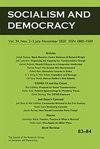恩格斯的军事思想:历史唯物主义与现代战争
Q4 Social Sciences
引用次数: 0
摘要
弗里德里希·恩格斯(Friedrich Engels)的军事著作是他的著作中相对鲜为人知的一部分,尽管马克思主义理论家经常引用这些著作,强调技术进步与他所指出的军事冲突强度之间的联系。现存的文献相当古老,并且把恩格斯作为一个革命的战略家和理论家来关注,尽管也有一些作者认为恩格斯的军事兴趣对马克思主义在作战艺术和战术领域的学说的发展具有重要意义。我认为恩格斯的著作值得我们关注;在将历史唯物主义的方法论规则引入军事研究的背景下,我们可以重新发现他是一位富有洞察力的思想家。这使马克思主义者能够在科学的基础上拒绝资产阶级和乌托邦的观点,即自发的和无组织的武装起义是进行社会革命的有效手段——遵循奥古斯特·布朗基或奥古斯特·威利希的观点。此外,关于恩格斯在这一领域的贡献的认识现状需要更新和系统化。这将使讨论几个重要问题成为可能。例如,本文章由计算机程序翻译,如有差异,请以英文原文为准。
Engels’s Military Thought: Historical Materialism and Modern Warfare
Friedrich Engels’s military writings are a relatively poorly known part of his output, even though Marxist theoreticians frequently make references to them highlighting the links between technological progress and the intensity of military conflicts identified by him. The existing literature is pretty old and focuses on Engels as a revolutionary strategist and ideologue, although there are also works written by authors who consider his military interests as being of importance for the development of the Marxist doctrine in the field of operational art and tactics. I think that Engels’s works deserve our attention; they allow us to rediscover him as an insightful thinker in the context of transferring methodological rules of historical materialism into military studies. This enables Marxists to reject on scientific grounds the bourgeois and utopian view that spontaneous and disorganized armed uprisings – following the views expressed by August Blanqui or August Willich – are efficient means for conducting social revolutions. Moreover, the current state of knowledge on the contribution of Engels in this field requires updating and systematization. This will enable discussion of several significant issues. For example,
求助全文
通过发布文献求助,成功后即可免费获取论文全文。
去求助
来源期刊

Socialism and Democracy
Social Sciences-Sociology and Political Science
CiteScore
0.50
自引率
0.00%
发文量
34
期刊介绍:
Socialism and Democracy is committed to showing the continuing relevance of socialist politics and vision. Socialism and Democracy brings together the worlds of scholarship and activism, theory and practice, to examine in depth the core issues and popular movements of our time. The perspective is broadly Marxist, encouraging not only critique of the status quo, but also informed analysis of the many different approaches to bringing about fundamental change, and seeking to integrate issues of race, gender, sexuality, ethnicity and nationality with the traditional focus on class. Articles reflect many disciplines; our geographical scope is global; authors include activists and independent scholars as well as academics.
 求助内容:
求助内容: 应助结果提醒方式:
应助结果提醒方式:


